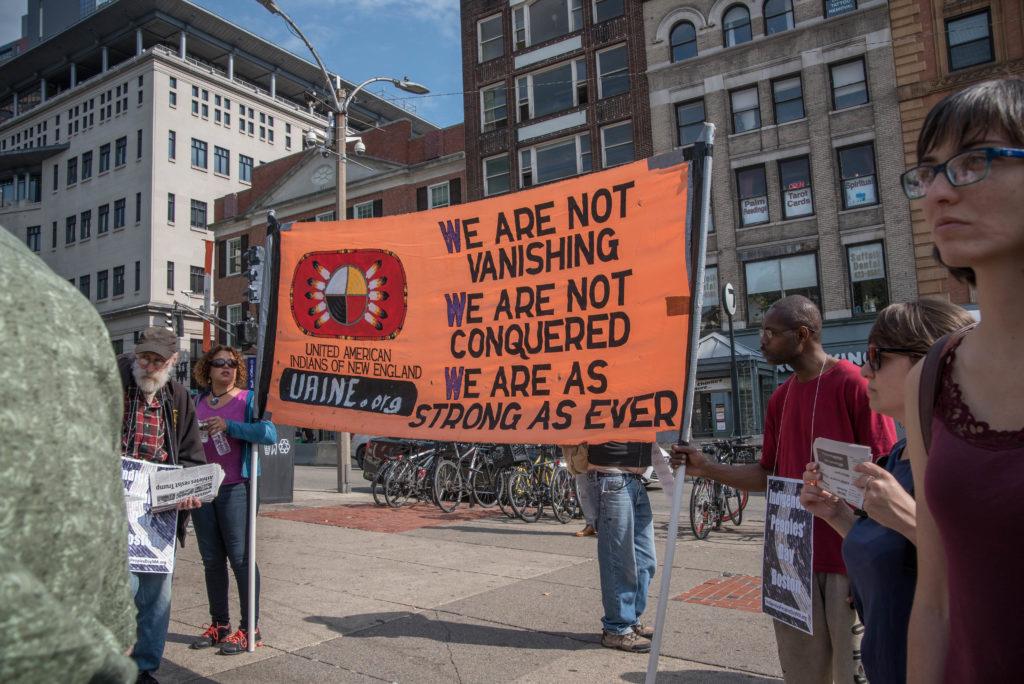By Janette Ebbers, news staff
More than 100 people gathered Saturday in the name of replacing Columbus Day with “Indigenous People’s Day.” They stood in the afternoon heat outside the Park Street Station in downtown Boston to march and listen to speeches.
Mahtowin Munro, organizer of the protest and head of Indigenous Peoples Day Boston, is a member of the Lakota tribe and a longtime activist in the Boston area. She said the goal of the event was to protest the glorification of Christopher Columbus and to promote Native American culture.
“It’s really important to, first of all, stop celebrating Columbus as a hero,” Munro said. “But the other thing is, it’s even more important to do something positive, to have Indigenous People’s day, to learn about the history of the area where you are. It’s important to understand that there are indigenous people who still live here — that we are resilient, that we continue have our cultures and our families.”
Protesters held signs reading “#Sinking Columbus, Indigenous People’s Day now,” “The most dangerous immigrant arrived in 1492” and “Why would anyone want to keep a statue that celebrates indigenous genocide.”
The event kicked off with a soundtrack of Native American songs, while a young woman in traditional indigenous clothing slowly moved around the circle with a goblet of burning copal, a ceremonial incense to pre-Columbian Mesoamerican cultures. Munro gave the opening speech and talked about how, to her people, Columbus symbolizes catastrophe.
“Columbus did not bring civilization to us,” she said. “We already had multiple civilizations. We did not need anybody to come here to show us how to live, teach us how to pray or who we should pray to. Columbus was not a hero at all. In fact, he and his men killed people by the thousands, the Taino and Ottowa people whose lands they invaded.”
Last year, Indigenous People’s Day Boston was instrumental in passing the resolution to change the name of Columbus Day in Cambridge.
Many of the people attending the protest aimed to reach concrete milestones — like changing the name of Columbus Day — and increase awareness of indigenous issues in general. One attendee, Nina Lytton, 59, is a staff member of Humanist Hub, a Boston nonprofit religious advocacy group.
“I would like to see recognition,” Lytton said. “We’re not educated to know what the history of our country is, or at least not the bad parts. I’m not blaming — I want to share the awareness and find a way to live together.”
Emphasizing the importance of awareness, Lytton said in other countries there is more recognition of indigenous deaths. In Australia, for example, the country recognizes “National Sorry Day” in remembrance of the mistreatment of their native population.
Others at the event were similarly troubled by the disparity between the truth and what they learned about Columbus in school. Desiree Goodwin, a 53-year-old librarian from Arlington, Massachusetts, said the lack of education in United States schools was especially concerning.
“I want to help promote awareness of what Columbus really represented, what he really did,” Goodwin said. “It was not what we were taught in school, which was ‘discover America.’ America was already here, there were already indigenous people here.”
Zoe Vandershmidt, a 29-year-old data analyst from the Boston area, held a sign reading “White Silence is White Violence.” Vandershmidt, who grew up in Lexington, Massachusetts, and attended college at New York University, said this lack of education was an issue even in liberal schooling systems.
“History is written by the conquerors a lot of the time, and you have to keep that in mind when you’re learning things,” Vandershmidt said. “Even in a progressive school like the one I went to, you get a very different version of how things happened.”
The march ended at the statue of Christopher Columbus by the waterfront, where a young woman looped a sign reading “Christopher Columbus was a genocidal slave-trader” around its neck, to cheers from the assembled crowd. A police officer requested the woman take it down to respect public property, but after chants from the crowd to “leave it up,” the officer made a phone call and allowed the sign to remain.
Munro also spoke on the injustice she felt over the lack of public recognition.
“We’re largely erased here,” Munro said. “When people are talking about anything, they very rarely mention indigenous people or our issues or our concerns, so this is to un-erase us. We need to be there, because we are the original inhabitants of this land, and anyone who is standing anywhere in the Americas is standing on indigenous land.”









